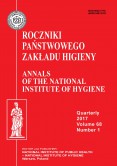Rocz Panstw Zakl Hig 2022, 73(2): 183-189
Sense of self-efficacy and the content of energy and nutrients in the diet of elite Polish basketball players
[Sense of self-efficacy and the content of energy and nutrients in the diet of elite Polish basketball players]
ABSTRACT
Background. In research on the subject, the predictive importance of personal resources is indicated for diet quality.
Objective. The aim of the study was quantitative assessment of diet depending on the level of generalised self- efficacy among elite Polish basketball players.
Material and Methods. Food diaries (2 training days and 1 no training day) of 48 basketball players were analysed. Further assessed were 144 food rations based on the Diet 6.0 program, and the results were compared to the current Polish nutritional standards. The Generalised Self-Efficacy Scale (GSES) was also used. Statistical analyses were performed by estimating Spearman's rank correlation coefficients (p<0.05).
Results. The share of energy from proteins, fats and carbohydrates was 18.2%, 29.4% and 52.4%, respectively. Of the mineral salts, the average diet contained: 2,107.6 mg sodium, 2,918.3 mg potassium, 736.3 mg calcium, 1,372.2 mg phosphorus, 380.1 mg magnesium, and 11.6 mg iron. Of the vitamins, the average diet contained: 1,100.3 μg of vitamin A, 5.3 μg of vitamin D, vitamin E in the amount of 8.2 mg, 78.1 mg of vitamin C, 1.1 mg vitamin B1, 1.3 mg vitamin B2, 1.9 mg of vitamin B6, 271.7 μg of vitamin B9 and 4.7 μg of vitamin B12. It was also shown that as the sense of self-efficacy developed, the supply of energy, water, protein, digestible carbohydrates, energy from carbohydrates, sucrose and PUFAs also increased in the players’ diets. At the same time, along with the increase in self-efficacy, the supply of: Na, K, Ca, Mg, P, Fe, Cu and iodine as well as vitamins: A, E, B1, B3, B6 and C, also increased in the players’ diets.
Conclusions. Incomplete diet balance has been demonstrated, as well as significant relationships between the level of self-efficacy and the supply of certain nutrients in the diet of elite Polish basketball players. The obtained results indicate the legitimacy of diet monitoring and nutritional education as well as considering personality traits in activities promoting maintaining a proper diet among athletes.
STRESZCZENIE
Wprowadzenie. Badania wskazują na predykcyjne znaczenie zasobów osobistych dla jakości diety, która jest jednym z czynników warunkujących sukces sportowy.
Cel. Celem badań była ilościowa ocena sposobu żywienia w zależności od poziomu własnej uogólnionej skuteczności elitarnych polskich koszykarzy.
Materiał i metody. Analizie poddano dzienniczki żywieniowe (2 dni treningowe i 1 beztreningowy) 48 koszykarzy. W oparciu o program Dieta 6.0 oceniono 144 racje pokarmowe, a wyniki odniesiono do aktualnych norm polskich żywieniowych. Zastosowano także Skalę Uogólnionej Własnej Skuteczności (GSES). Analizy statystyczne przeprowadzono szacując współczynniki korelacji rangowych Spearmana (p<0,05).
Wyniki. Udział energii z białek, tłuszczów i węglowodanów wynosił odpowiednio: 18,2%, 29,4% i 52,4%. Spośród soli mineralnych, przeciętna dieta zawierała: 2107,6 mg sodu, 2918,3 mg potasu, 736,3 mg wapnia, 1372,2 mg fosforu, 380,1 mg magnezu i 11,6 mg żelaza. Spośród witamin, przeciętna dieta zawierała: 1100,3 μg witaminy A, 5,3 μg witaminy D, 8,2 mg witaminy E, 78,1 mg witaminy C, 1,1 mg witaminy B1, 1,3 mg witaminy B2, 1,9 mg witaminy B6, 271,7 μg witaminy B9 i 4,7 μg witaminy B12. Wykazano ponadto, że wraz z nasianiem się poczucia samoskuteczności, w diecie zawodników zwiększała się podaż energii, wody, białka, węglowodanów przyswajalnych, energii z węglowodanów (p<0,001) oraz sacharozy (p=0,021) i PUFA (p=0,017). Zarazem wraz z nasilaniem się poczucia samoskuteczności, w diecie koszykarzy zwiększała się podaż sodu (p=0,042), potasu (p<0,001), wapnia (p=0,045), magnezu (p=0,007), fosforu (p=0,026), żelaza (p=0,013), miedzi (p<0,001) i jodu (p=0,042) oraz witamin: A (p=0,002), E (p=0,034), B1 (p<0,001), B3 (p<0,001), B6 (p<0,001) i C (p=0,049).
Wnioski. Wykazano niepełne zbilansowanie diety oraz istotne zależności pomiędzy poziomem poczucia własnej uogólnionej skuteczności a podażą niektórych składników pokarmowych w diecie elitarnych polskich koszykarzy. Wskazuje to na zasadność monitoringu diety i edukacji żywieniowej oraz uwzględnianie cech osobowości w oddziaływaniach promujących prawidłowy sposób żywienia sportowców.
Downloads: 1291


